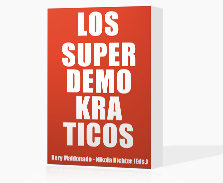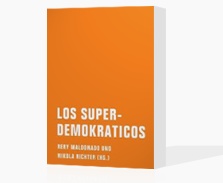by
Leo Felipe Campos
I’m more interested in the situation of the city where I live in, than the situation of the country. Caracas hosts between 4 and 8 million inhabitants, depending on who’s speaking; between 22 and 80 deaths per week, depending on the newspaper or on Government’s representative publishing the numbers; it has seven majors, but one, which in fact is the “major” of other five, does not or is not allowed to work, because the seventh city hall, recently created by executive power (In Venezuela, the main one), belongs to government’s political party, and therefore, is the major with bigger influence. Or not.
Anyway, it’s a huge amount of money flowing and disappearing, and I have to ask myself, as a citizen and pedestrian that it’s not too poor, neither too rich or too artist to play the political game, if resources are addressed to where they should go, or if they even arrive there. There are seven city halls, but they could be six, or five and a half. In this city, being exact is just accessory.
Each one of the five-and-a-half or seven city halls has its own preventive security system, five of them have their own police brigades, who are allowed to arrest and punish if necessary, and some of them even control vehicle traffic, even though there’s already a state department called Instituto Nacional de Tránsito y Transporte Terrestre crowded with certified inspectors to do that job. I’ve read a statement from this department’s former president in 2008, and he said that 40% of all Venezuelan cars are at the capital, and that in that year more than 2 million cars rolled daily through its streets and roads, 400,000 of them to cross from state to state. Nowadays this number should be bigger, but when counting, seems to be that there’s a car for every second person in Caracas.
Or maybe for every fourth. It depends.
Until recently, peak hour was estimated between 6am and 8am, and 5pm and 7pm. Now, we round it up: between 6am and 7pm, or even a bit later, you could be trapped in a 1 or 2-hour traffic jam. So, if you drive or you travel in surface public transport: relax, there’s not much you can do.
Caracas has lots of parks. It’s a grey city with green spots, like its huge, Caribbean Sea oriented, dyed hair look-like hill; and has a quite blue sky too. To continue with the men-like game, beard and body hair were those hills with trees, diagonal fields, waste land and scrubland: now, that’s all self made houses, made of bricks, zinc, concrete, hope and, in particular areas, with loads of fear whenever it rains, as it does.
In Caracas there are at least 35 malls. There, the biggest, those with a repeated double consonant, italic and chic name; here –all right, I’m going to explain the joke-, these malls, along with this hundred of middle-level buildings, are such a huge portion of Latin America’s Blackberry business volume, that the word “Socialism” has been undressed and runs away from our reality, too.
As in many other cities around this continent, in Caracas contrast is the rule. It’s easy to see million-dollars mansions, where ministers, government representatives, lucky heirs and business men live, some with dignity, others without it –they fearless lost it in their teens. They are maybe one hundred, one thousand or 20,000: we already know, exact numbers don’t matter. There are also millions of ranches, two, four, seven millions, where hunger is disturbing, we all know life is harder when there’s not much to eat. Quite harder.
Guns? Just in Caracas, a police force confiscated 2,166 just in 2009’s first six months. This means: twelve a day. But if you talk to somebody or if you read Op-Eds, you’ll just believe that there are millions of them, both legal and illegal. Conservatives say: there are 5 millions in the country. Apocalyptics say: 15. We’re talking about millions. Millions of guns, did you ever counted up to a million? Go ahead. Give it a try.
What does it matter three and a half, or nine thousand nine hundred? Such numbers should shame us. Best case scenario: let’s ignore it, there are so many other things, better things to focus on, like go dancing or travelling, for example, here all that’s very easy. Worst case scenario: let’s multiply guns per decades of indolence, and those decades per bullets, and now, let’s think who’s taking all that money.
In Caracas you’ll find all the best and worst things of mankind, a French friend of mine told me a couple of weeks ago. She’s been living here for two years, and she lived before in the US, Spain, Mali, Madagascar, Mexico and Brazil, and she’s been in Eastern Europe, Southern Cone and Colombia. How’s that?, I asked to her: Well, I’ve never met nicer and more supportive persons than in Venezuela, but I’ve never seen so much evil as here. Believe me, at least with her, I’ve tried to belong to the first group.
With such bipolarity, and taking my friend’s words as true, it’s easy to see that we have here more than enough cars, motorcycles, guns, mobile phones, parks, malls and liquor stores to ease the pain and celebrate that we’ve got rum, and as long as we’ve got rum we’ve got hope. We also have more than enough hairdressers and gyms to shape the figure and to straighten long hairs on a Monday morning, and enough of big pharmacy megastores where you could buy corn flour or photographic cameras and Viagra, normally sold out on a Friday evening.
They ask me: how do you see this place’s situation. There’s the answer, broadly speaking. Caracas is ugly, but somehow it charms you because of its intensity: you’ll never get bored of it. It’s like a drug that strikes, hides you from yourself, shows you that you should immediately leave before is too late. They also ask me: do you think you can influence upon it. Honestly? I was cofounder from four magazines, three of them cultural, I worked in a museum in the period, in which I thought Art could reach all people, I supported 2006 World Social Forum and Alternative Social Forum as well, which played against the first ones; I made editorials in a TV news broadcast in politically highly-polarized times, I wrote some chronicles about abandoned places in the city, I organized talks, debates and public parties. I gave a couple of workshops about what I consider good narrative journalism (Martí, Walsh, Capote, Kapuscinski, Rotker, Lemebel, Monsiváis, Caparrós, Guerriero, Salcedo Ramos, Muñoz, Duque, etcetera), and in everyone of all those things I gave my best, first thinking in myself, afterwards in my closest circle, afterwards in Caracas. Even though, I don’t think I’ve had any influence in the city, for good or for bad, further than my closest circle and in a very short period of time. I don’t think it’s possible, and sometimes I wanted to convince myself I didn’t matter, but the truth is: as long as I live here, I’ll keep trying.
Leo Felipe Campos
Translation: Ralph del Valle

 Temas
Temas



